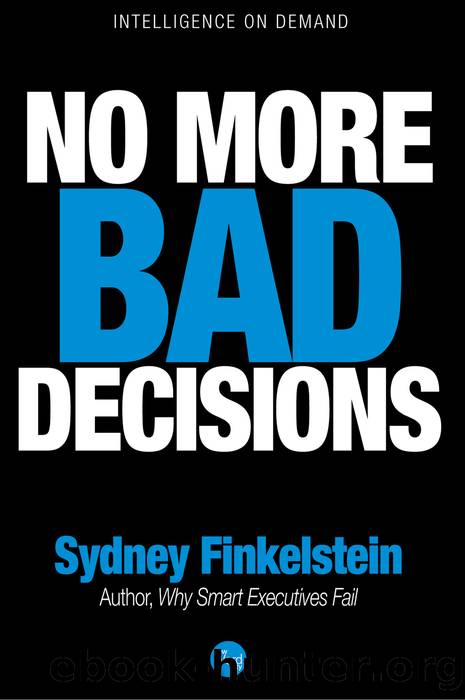No More Bad Decisions by Sydney Finkelstein

Author:Sydney Finkelstein [Sydney Finkelstein]
Language: eng
Format: epub
ISBN: 9781936529148
Publisher: New Word City, LLC
Published: 2014-01-23T00:00:00+00:00
âDonâtâ confuse me with the facts.â
In sharp contrast, everyone is familiar with the third red flag of poor decision-making: prejudgment. And to outsiders, itâs painfully obvious when someone decides that this is what he or she is going to do and sticks to that decision, no matter what facts come to light or how the situation changes.
We all make prejudgments. We stick with them even when contradictory facts start to pile up; we deny them, suppress them, or shoot the messenger who brings them. We come up with excuses and rationalizations to reinforce the decision. You might think that smart people would see their error, but I have found that the smarter we are, the better we are at finding ways to justify our prejudgments.
And as you have noticed, these mechanisms for emotional decision-making can reinforce each other. An Wangâs verdict on the personal computer can be traced to his experience with IBM, but it was also a prejudgment that he stuck with nearly to the end. When Hurricane Katrina hit New Orleans, the head of the operations section of the Department of Homeland Security, relied on his experience of recent hurricanes in Florida to make the prejudgment that this one would be no different. Later, he testified to Congress that early in the storm, he watched a report on CNN that showed people partying in the French Quarter and rejoicing that they had dodged a bullet. That image was vivid enough to justify him in ignoring literally dozens of reports that the storm was a catastrophe.
A similarly fixed idea had Kenneth D. Lewis in its grip during the climactic weekend of the financial meltdown. Bear, Stearns had already collapsed, swallowed up in a fire sale to JPMorgan Chase. The wolves were baying after Lehman Brothers, and, all but unbelievably, Merrill Lynch - Wall Streetâs biggest broker - was mired in trouble and looking for a savior.
To Lewis, it was a dream come true. As chairman of Bank of America, he longed to rival his mentor and predecessor, Hugh McColl, who had reshaped the banking industry. What trophy could be shinier than Merrill Lynch? Lewis had already acquired three major banks and the mortgage company Countrywide, and he thought he understood the acquisitions drill. And this combination of unconscious self-interest and misleading experience led him to a disastrous prejudgment: He would buy Merrill Lynch, come what may.
The cyclone in the financial markets and the growing pressure from Washington left only the weekend to perform hasty due diligence on Merrillâs books and put together the deal. Never mind; Lewis pushed it through his board, offering $50 billion for Merrill Lynch. Only later did it become clear that Merrillâs assets were a toxic stew of subprime mortgages, collateralized debt obligations, and credit default swaps. Ultimately, the government had to come up with $45 billion for Bank of America and another $98 billion in guarantees; within a year, Lewis was history.
Download
This site does not store any files on its server. We only index and link to content provided by other sites. Please contact the content providers to delete copyright contents if any and email us, we'll remove relevant links or contents immediately.
Zero to IPO: Over $1 Trillion of Actionable Advice from the World's Most Successful Entrepreneurs by Frederic Kerrest(4566)
Machine Learning at Scale with H2O by Gregory Keys | David Whiting(4312)
Never by Ken Follett(3953)
Harry Potter and the Goblet Of Fire by J.K. Rowling(3856)
Ogilvy on Advertising by David Ogilvy(3621)
Shadow of Night by Deborah Harkness(3366)
The Man Who Died Twice by Richard Osman(3077)
Book of Life by Deborah Harkness(2937)
The Tipping Point by Malcolm Gladwell(2920)
Will by Will Smith(2919)
Purple Hibiscus by Chimamanda Ngozi Adichie(2851)
0041152001443424520 .pdf by Unknown(2845)
My Brilliant Friend by Elena Ferrante(2829)
How Proust Can Change Your Life by Alain De Botton(2812)
How to Pay Zero Taxes, 2018 by Jeff A. Schnepper(2653)
Hooked: A Dark, Contemporary Romance (Never After Series) by Emily McIntire(2553)
Rationality by Steven Pinker(2363)
Can't Hurt Me: Master Your Mind and Defy the Odds - Clean Edition by David Goggins(2339)
Borders by unknow(2312)
